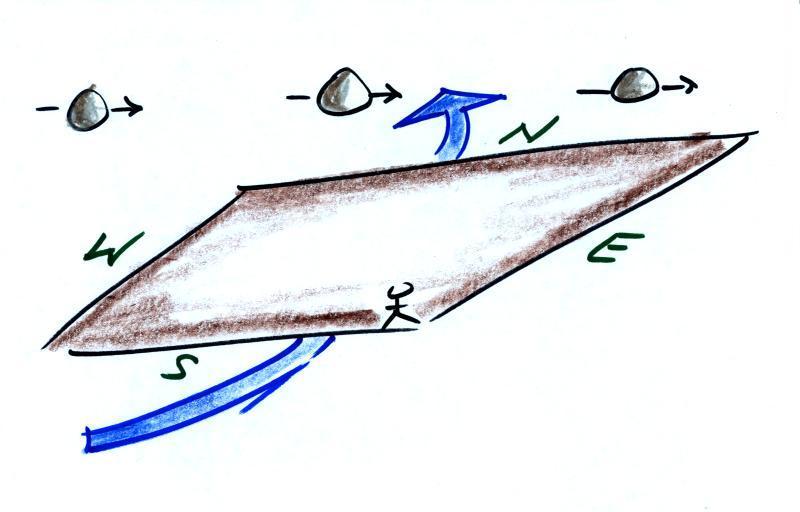Here's a short look at the cause of the Coriolis force.
Imagine something flies overheadTucson. It
travels
straight from west to east at constant speed.
You
would, more
or less subconciously, plot its path relative to reference points
on the ground.The next figure
shows the path that
the object followed, relative to the ground, as it passed over the city.
It would appear to be moving in a straight line at constant
speed. You would conclude there was zero net force acting on the
moving object (Newton's first law of motion).
In this second picture the object flies by overhead
just as it
did in the previous picture. In this picture, however, the ground
is moving (don't worry about what might be causing the ground to move).
This is the path that you would see relative to the
ground
in this
case. Even though the object flew from west to east it
appears to have been traveling from the NW toward the SE because the
ground was moving as the object passed overhead. Because
the motion is still in a straight line at constant speed, you would
conclude the net force acting on the object was zero.
In this last figure the object flies by again from
west to
east. In this case however the ground is rotating.
Now the path of the object plotted on the ground appears to be
curved. If you ignore the fact that the ground is moving then
there must have been a force causing the moving object to follow the
curved path. The needed force would be perpendicular
to the direction of motion and to the right in this case.
At most locations on the earth the ground IS rotating (we're just
not
aware of it). This is
most easily seen at the poles.
Imagine a piece of paper glued to the top of a globe.
As the
globe spins the piece of paper will rotate. A piece of paper
glued to the globe at the equator won't spin, it will flip over.
At points in between the paper would spin and flip, the motion gets
complicated.
The easiest thing for us to do is to ignore the fact that the
ground on
which we are standing is rotating. However, if we do that we need
to account for the curved paths that moving objects will take when they
move relative to the earth's surface. That is what the Coriolis
force does.







